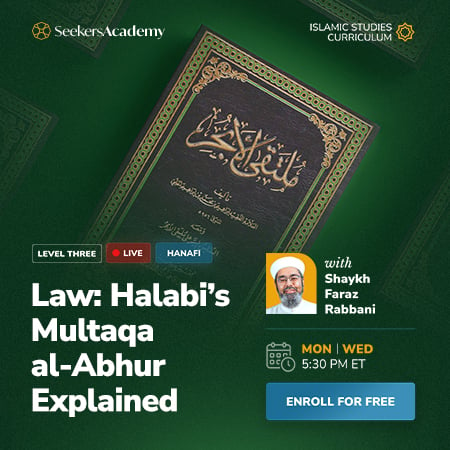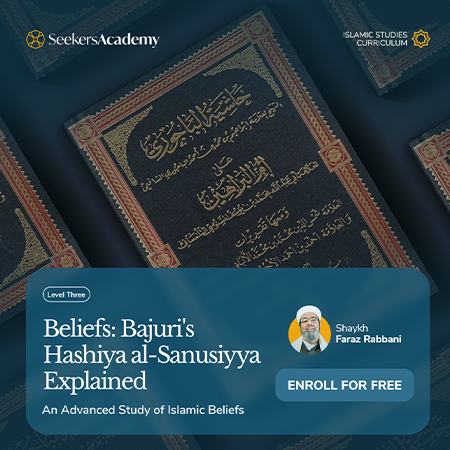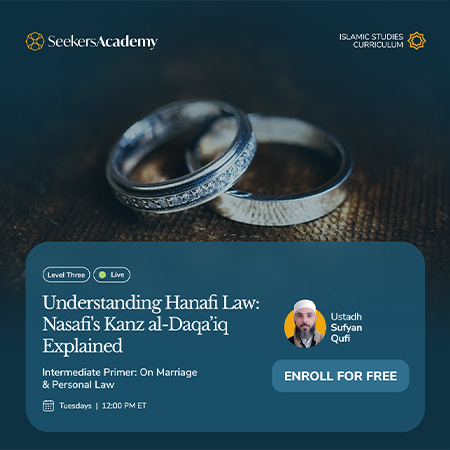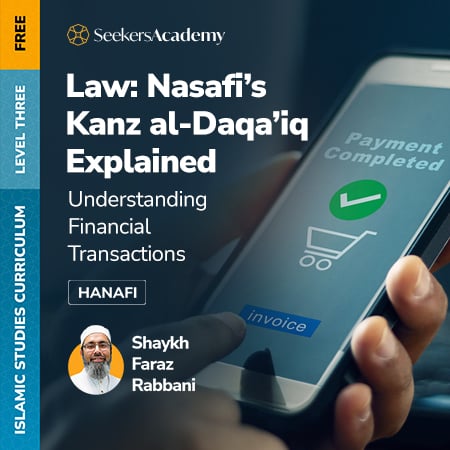
This is a Level Three course in Islamic Law (fiqh) in which Shaykh Faraz Rabbani covers the “Meeting of the Oceans” (Multaqa al-Abhur) by Imam Ibrahim al-Halabi (d. 956 AH). This is one of the most commented-upon texts, for good reason - as it gathers, with clarity and precision, the main issues and legal details in Hanafi fiqh.
Multaqa al-Abhur is an intermediate-level “meta-primer” (matn) that gathers the issues of the four core primers in Hanafi fiqh: Quduri’s Mukhtasar, Mawsili’s Mukhtar, Nasafi’s Kanz, and the Wiqaya, with key issues from the Marghinani’s Hidaya and Ibn al-Sa’ati’s Majma` al-Bahrayn.
With this, the text is written in a clear style, and the author selects the most relied-upon positions in the differed-upon issues and mentions them first.
Among its main commentaries are Majma` al-Anhur of Shaykh Zada (d. 1078), whose work was deeply influential in subsequent Hanafi scholarship, and is frequently referred to by the commentators of the late Ottoman legal code, the Majalla. This is due to its clarity of explanation, its lucid presentation of legal reasoning, and its precision.
This is a Level Three Upper-Intermediate course in the Seekers Islamic Studies Curriculum. It is meant to deepen a student’s understanding of legal details, nuances, and legal reasoning.
It is for someone who has completed at least one—or, ideally, two—complete primers (mutun) in Hanafi fiqh. It assumes the student has active familiarity with the core issues, across chapters, and is ready to understand:
(1) legal details
(2) more nuanced issues
(3) the legal reasoning, and
(4) to refer to core reference works.
This course is important for students who wish to deepen their understanding of legal details, nuances, and legal reasoning.
The core Level Three Hanafi fiqh course is Imam Nasafi’s Kanz. This course complements, supplements, and completes a student’s consolidation of their understanding of the core issues of Islamic law.
A faqih (true jurist) is “one who has mastery of the core issues (furu`) with understanding and the ability to apply them. This course is a proven classical text that trains the student of Islamic law.
The text, Multaqa al-Abhur, is more nuanced than any one of the primers in the Hanafi school—such as Quduri or the Kanz (as it contains the issues of all four main primers).
As such, the student will be exposed to much of the issues that commonly occur in their lives and others’ lives across the chapters of Islamic law: worship; marriage and divorce; financial transactions; halal and haram; and public law.
It will enable students to act on the Divine Command with more clarity; and to be able to convey legal rulings, explain them, and answer questions with more clarity, precision, and nuance.
They will also have a greater understanding of how fiqh works; how to navigate differing narrations and positions within the Hanafi school; and how to research in the commentaries and reference works of the school.
- Teacher: Shaykh Faraz Rabbani
The “Meeting of the Oceans” (Multaqa al-Abhur) by Imam Ibrahim al-Halabi (d. 956 AH) is one of the most commented-upon texts in Islamic law (fiqh), and for good reason—as it gathers, with clarity and precision, the issues of the four main primers (mutun) in Hanafi fiqh.
Another major commentary that will be actively referred to is al-Durr al-Muntaqa by Imam Ala’ al-Din al-Haskafi (d. 1088 AH), who is one of the foremost of the late reference-scholars (muhaqqiqin) of the Hanafi school. His other major legal work is al-Durr al-Mukhtar, upon which is Ibn Abidin’s Radd al-Muhtar (famous as Hashiya Ibn Abidin, or simply “Shami”).
Shaykh Faraz will also be referring to other commentaries on the Multaqa, most notably Kamal al-Diraya of Imam Izmiri (d. 1165 AH) and Muhtada al-Anhur of Allama Wahdati (d. 1130 AH)
- This is a Level Three Upper-Intermediate level course in the Islamic Studies Curriculum. As such, it is recommended that the student has completed Level Two, or its equivalent, first.
- In fiqh, a complete study of at least Quduri’s Mukhtasar or Mawsili’s Mukhtar, and ideally the Kanz as well, is desirable. After this, the diligent student will be well-prepared for studying Tumurtashi’s Tanwir, Mawsili’s Ikhtiyar, or Marghinani’s Hidaya.
- The nuances and details of the foundational issues of Islamic law
- The methodology, reasoning, and key principles of the Hanafi school
- How to navigate different narrations and positions within the school—and how to find the relied-upon positions
- How to research issues in the commentaries and reference works of the school.


